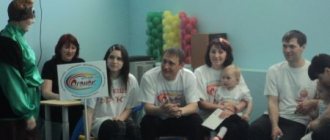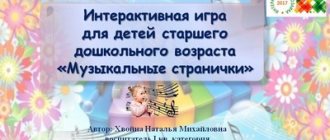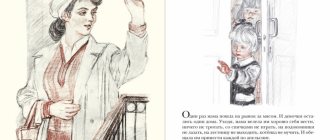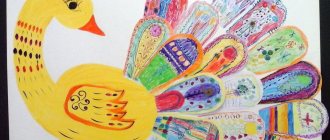Literary living room as a form of nurturing love and interest in the literary word among preschoolers
Tamara Okhlopkova
Literary living room as a form of nurturing love and interest in the literary word among preschoolers
1. Relevance of the topic.
“Poetry is constantly present in the life of an adult, helping to express the emotional state and experiences. Poems are our assistants – “psychotherapists” in moments of joy and moments of emotion. Without them, our life would be... ordinary..." (1, p. 5)
Unfortunately, the need for reading literary texts and poetry among children and adolescents has decreased. This is largely due to communication on social networks, where the value of the literary word is reduced: abbreviations and slang are often used. Another reason is the impoverishment of adult speech.
According to psychologists, it is possible to instill a love of books and reading only before the age of nine. Later it is very difficult to do this, and sometimes almost impossible. Therefore, the task of cultivating interest in poetry and literature should be solved already in preschool age.
How can we ensure that poetry plays a significant role in children’s lives?
In search of ways to increase interest in poetic works, we came up with the idea of creating a literary living room.
2. “Literary living room” as a form of organizing children’s artistic and creative activities.
This form of organizing literary leisure is widely used in schools; we tried to adapt it to the conditions of a preschool institution.
The living room is a form of casual, friendly communication between participants in accordance with the theme. The subject of discussion in the literary drawing room is issues of poetry and art, since these areas of public life are closely related.
The purpose of the literary drawing room
- instill a love for the native word, promote the development of creative abilities, and help strengthen friendly relationships between children and teachers.
3. Principles of organizing a literary lounge in a preschool educational institution.
In order for this form of organizing children’s activities to have the greatest effect, it is necessary to comply with certain rules and take into account the nuances that would distinguish this event from the usual entertainment and matinees.
So, the basic principles of organizing a literary living room are as follows:
1) decoration of the room in the “living room” style
- rooms for receiving guests.
The chairs are arranged in a semicircle so that the participants can see each other. The table is covered with a tablecloth, candles, books in accordance with the theme, and portraits of poets are displayed. The teacher acts as the hostess of the living room. It is very important to create an atmosphere of goodwill and warmth.
2) three meetings are planned during the academic year
(autumn, winter, spring).
Too frequent “meetings” reduce interest and become mundane. In addition, such events require careful (but not tedious) preparation and preliminary work. Otherwise, we will not receive a feeling of joy from the expected meeting.
3) topics and repertoire are selected
- depending on the speech, intellectual and age capabilities of children;
— taking into account socially significant problems;
- taking into account the season of the meeting.
So, this could be a meeting dedicated to the work of A. L. Barto, if children of primary or secondary preschool age are preparing for it. In the year of A.S. Pushkin’s anniversary, the children of the senior and preparatory school groups were immersed in the atmosphere of the work of this poet. To attract children's attention to the beauty of their native nature, poems by poets about a certain time of year, for example, winter, are selected.
4. Stages of work
1) planning
At the beginning of the school year, taking into account the number of children and the annual work plan of the institution, we outline the dates for holding the literary lounge.
2) selection of literary works
–
this is the next stage.
When selecting, we focus on the age, speech and intellectual capabilities of children, as well as significant events in the surrounding world. 3) selection of attributes, video and audio sequences
This is a very important stage. It is the objective environment, visual pictures and images, music and theatrical noises that create the atmosphere and enhance the impression of a literary work. The skillful use of music and artistic design has a positive effect on a preschooler’s understanding of a poetic work, helping to better perceive the artistic images embodied in it
4) preparatory work with children: learning texts, working on expressive speech
The longest stage. The work is carried out individually. Together with the child, the meaning of words and expressions, the nature of the work and, as a result, the intonation with which it should be recited are revealed. Attention is drawn to such qualities of poetry as sound writing (of course, this concept is not given to children, but it is emphasized that, for example, in a poem about a nightingale the sound “s” is often found, and this makes it seem like it is like a bird’s song).
Since children often have difficulty memorizing text , we use various techniques:
-“We tell poems with our hands”: relying on gestures;
- “Say a word”: the child finishes the line;
-examination of illustrations, photographs, observation of objects and phenomena;
— we use graphic modeling;
- we use staging and dramatization of the plot of the work.
5) the meeting itself in the literary drawing room
On the appointed day, all participants gather in the “living room”. In our case, this is a music room, or rather a part of it, decorated in accordance with the theme and spirit of the “living room”.
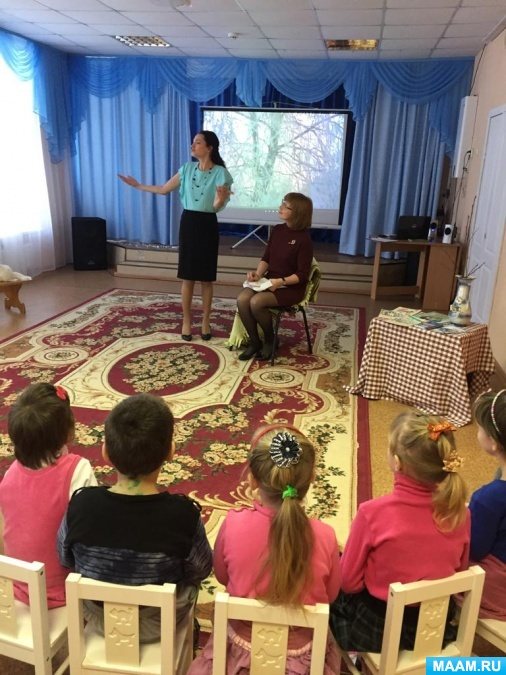
5. Algorithm
1) welcoming guests by the hostess;
2) announcement of the topic;
This could be a riddle, watching a video, listening to a poem performed by theater and film actors (recorded), or reading a literary work by the teacher himself.
3) a conversation with children within the framework of the topic of the meeting (about the event or phenomenon to which it is dedicated; about the poet or author).
4) acquaintance with the work of the poet (poets) within the framework of the topic.
Inviting children to perform poetry (using appropriate music, paraphernalia, elements of dramatization, listening to songs based on the poet’s poems, viewing illustrations or excerpts from radio shows based on the writer’s work. It is very important to create an atmosphere of ease, each child is noted, his desire to recite a poem is encouraged.
5) end of the meeting.
At the end of the event, teachers and children review a selection of books, a thematic exhibition of drawings, or create a creative product: a panel, a painting in accordance with the theme of the meeting. Children take the books they like into the group and continue to get acquainted with the works together with the teacher.
6. Conclusions.
According to our observations, children are interested in such informal meetings. They liberate children, increase interest in the process of learning poetry, instill interest in books, have a positive effect on speech development, give warmth to communication, and cultivate aesthetic taste and general human culture.
Literary evening in kindergarten in the preparatory group on the topic: Autumn
Scenario of the literary evening “Autumn with a fox step...”, dedicated to the work of Irina Petrovna Tokmakova for children of the preparatory group
Author: Irina Viktorovna Shilova, music director of the MADOU “Kindergarten “Solnyshko” p. Bagaevka Municipal District "city of Saratov" Description: This scenario will be of interest to music directors, educators, and elementary school teachers when holding poetry evenings, literary lounges, and poetry evenings. The material is intended for children in the preparatory group. Goal: - to create interest in the work of the poetess Irina Petrovna Tokmakova. - instill a love of poetry. Objectives: Educational:
- generalize and consolidate children’s ideas about the work of Irina Tokmakova;
- learn to read poetry expressively. — teach how to give joy to people with your performance. Educational:
- cultivate interest and love for books;
- cultivate moral qualities. Developmental:
- develop speech, memory, creative abilities;
- develop communication skills. Preliminary work: reading the works of Irina Tokmakova. Memorizing the poetess's poems.
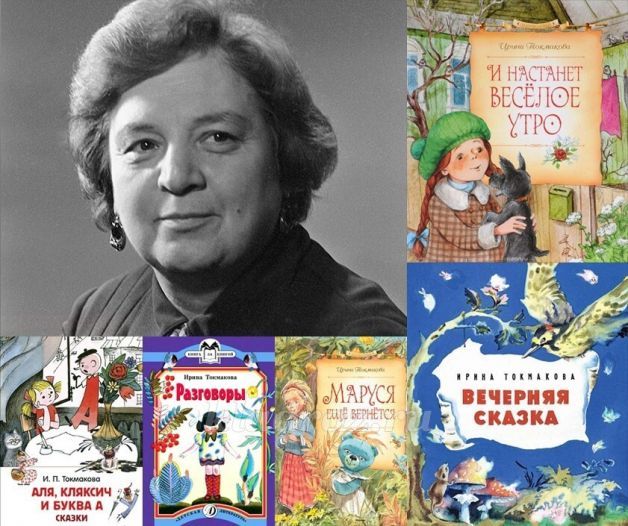
Progress of the literary evening
Children enter the hall. Presenter: Guys, hello, let's smile affectionately and give everyone a good mood with our smile. Our meeting today is dedicated to one kind, talented woman. Her name was Irina Petrovna Tokmakova. She would have turned 92 in 2022. Her poems, funny and serious, instructive and kind, fairy tales, translations and “fun textbooks” - all dedicated to children of preschool and primary school age. “From childhood, I realized that children need care and affection. Otherwise they will not survive. Feeding and clothing is not enough. Children must be loved,” Irina Petrovna Tokmakova said. That's how she loved you children. Today I invite you on a journey through the poems of Irina Petrovna Tokmakova. And the motto of our journey will be the words spoken by Irina Petrovna herself: “Only good things are prophesied, only joy lies ahead...” But she also loved our nature, at any time of the year. This is the subject of a book called “Seasons.”
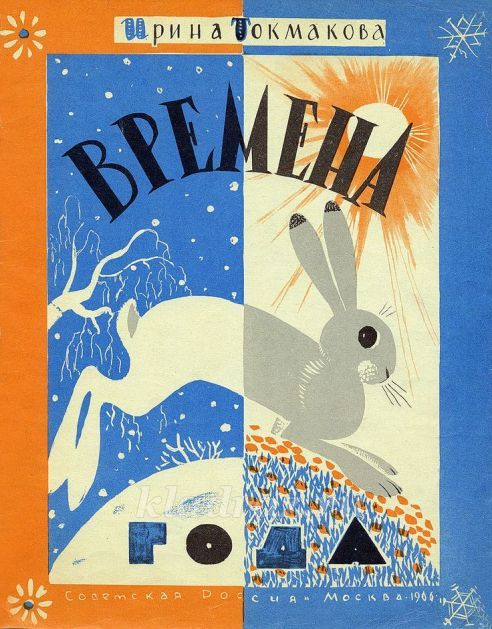
Windy, windy, The whole earth is ventilated!
The wind scattered the leaves from the branches around the world: Linden, Birch, Yellow leaf And pink, Red, Multi-colored, Old newspaper sheet... Sunny, Windy... Windy! Windy! Presenter: The wind rushes across the world like a rider on a greyhound horse. A boy and a girl come out. Boy: Fall off, leaves, Forgetting about summer. The autumn wind rushes on a trotting horse. Because of the blue sea, Jumps from afar. I missed my native space, that is. In thin vines, like a pipe, he whistles, returning from a foreign land, as if looking for something. Girl: I galloped to the village. There, disturbing the peace, Knocked apples and pears from the trees. It will whistle and whoop, The ringing harness will jingle, Golden streams will flow from the flexible branches. Fall off, leaves, Forgetting about summer. The autumn wind rushes on a trotting horse. Asen Bosev (translation by I.P. Tokmakova) Children sing a song about the wind. Presenter: Soon we will say goodbye to autumn, and so our evening dedicated to the work of Irina Petrovna Tokmakova has come to an end. Read and love poetry! Goodbye children!
We recommend watching:
Scenario for the autumn holiday in the preparatory group. Autumn fair in kindergarten. Scenario: Autumn festival of KVN in the preparatory group. Scenario Scenario of the “Golden Autumn” matinee in the preparatory group of the kindergarten
Similar articles:
Entertainment “Autumn Gatherings” in the preparatory group
Scenarios for autumn holidays in kindergarten
Scenario for an environmental holiday for the senior preparatory group. Birds are our friends
Summary of an educational lesson in kindergarten for children of the senior preparatory group on the topic: Autumn
Autumn reading competition in kindergarten. Scenario
MAGAZINE Preschooler.RF
Literary lounge for parents of preschool educational institution “Visiting Korney Chukovsky”Municipal budgetary preschool educational institution “Kindergarten of a combined type No. 37 “Solnyshko”, Ust-Ilimsk 2015
Shayakhmetova Olga Aleksandrovna, teacher-speech therapist.
Zatoplyaeva Lyubov Gerasimovna, teacher.
Shkurupinskaya Tatyana Petrovna, teacher.
Goal: to introduce parents to the traditions of family reading of literary works and to create a unified educational space for using the best examples of fiction in the social, moral, cognitive and speech development of children.
Form of holding: literary lounge for parents of preschool educational institutions.
Participants: speech therapist, educators, parents of children in the primary and secondary groups of preschool educational institutions.
Preliminary work:
Preparing visual material:
- Stand design for parents: “The World of Fairy Tales by Korney Chukovsky” , “Mom, Dad, I am a Reading Family” , “Child and Book” .
- Selection of literary works by K. Chukovsky for children's reading and creation of a library of the writer's poems and fairy tales.
- Together with parents, production of costumes for fairy-tale characters and attributes for the fairy tale “The Fly-Tsokotukha .
Equipment: multimedia installation, presentation, cut-out and plot pictures based on K. Chukovsky’s fairy tales: “Confusion” , “Telephone” , “Moidodyr” , “Barmaley”; objects of fairy-tale characters: galoshes, washcloth, jam, chocolate, balloon; audio recordings and attributes for the fairy tale “The Tsokotukha Fly” .
Plan:
- Information message for parents “The Great Storyteller K.I. Chukovsky" .
- Games with parents:
"Say the word".
"Familiar Pages".
"Fairy-tale character".
"Basket of Fabulous Finds".
"The Mysteries of Grandfather Korney".
"Extra item".
- A dramatization of the fairy tale “The Tsokotukha Fly .
- Summing up and awarding the winners.
Progress:
Leading. Hello, dear guests! We are glad to see you in this cozy room. 2015 has been declared the Year of Literature in Russia. And this evening we dedicate to the work of the scientist, writer, translator, literary critic Korney Ivanovich Chukovsky (slide - photograph of K.I. Chukovsky).
Not far from Moscow, in the village of Peredelkino (slide), in a small house lived for many years a man whom all the children in the country knew.
Tall, long arms with large hands, large facial features, a brushed mustache, an unruly strand of hair hanging over his forehead, laughing eyes and a surprisingly easy gait. This is the appearance of the famous children's writer. It was he who came up with many fairy-tale heroes: Muhu-Tsokotukha, Aibolit, Barmaleya, Moidodyr, with whom more than one generation of children grew up.
Being engaged in literary criticism, Chukovsky began to write children's poems and fairy tales completely by accident. And it happened like this. He was carrying his sick son on the night train. The boy was capricious, moaning, crying. And in order to somehow entertain him, Korney Ivanovich began to tell: “Once upon a time there was a crocodile. He walked the streets... " The child suddenly became quiet and began to listen. And the next morning, as soon as he woke up, he demanded that his father continue.
“Crocodile” was born . “Moidodyr” is also interesting .
While working in his office, the writer heard the loud cry of his youngest daughter, who did not want to wash herself. Korney Ivanovich left the office, took the girl in his arms and, quite unexpectedly for himself, quietly said to her:
“We must, we must wash ourselves in the mornings and evenings, And shame on unclean chimney sweeps! Shame and disgrace!"
“Moidodyr” appeared .
Interesting fact. Korney Chukovsky is the literary pseudonym of the writer. His real name is Nikolai Vasilyevich Korneychukov. The great storyteller came up with his literary name so successfully that it became fused with him and was inherited by his children, grandchildren and great-grandchildren.
We will take you on an unusual journey and meet the heroes of Korney Chukovsky’s fairy tales, which we loved so much. It is necessary to divide into teams. When you entered the hall, you were given colored chips. Participants with red chips are the 1st team, with blue chips – the 2nd team. And we will be judged by a fair jury (representation of the jury). Answers are scored using a point system. For each correct answer you will receive points. Whichever team has the most of them will receive the title of expert in the works of K.I. Chukovsky. Along the way, you will need ingenuity, humor, erudition and mutual assistance.
Game “Say the Word” (slide)
Simplicity of phrases, clarity and sonority of rhyme, bright and memorable characters, sparkling humor - these are the features of Korney Chukovsky’s poetic fairy tales, which are so easily and quickly remembered. As kids say, “it just rolls off the tongue . Even adults, now fathers and mothers themselves, grandparents, remember the sonorous lines from childhood:
“The blanket ran away, the sheet flew away, and the pillow, like a frog, Jumped away from me.”
And now we’ll play the game “Say the Word . Finish the sentence I started and name the work of Korney Chukovsky. The answer will be based on the first hand raised.
There's Wax on your neck, Under your nose... there's a blot. ( "Moidodyr" )
A fly went to the market and bought... a samovar. ( "Fly Tsokotukha" )
And again the bear: - Oh, save the walrus! Yesterday he swallowed a sea... urchin. ( "Telephone" )
Look into the tub and you will see there - ... a frog. ( "Fedorino's grief" )
With elephants on the move, we played... leapfrog. ( "Barmaley" )
The sea is burning with flames, A whale ran out of the sea. ( "Confusion" )
It's a shame for an old man to roar. You're not a hare, but... a bear. ( "Stolen Sun" )
But like a black iron leg the poker ran and galloped. ( "Fedorino's grief" )
Then the soap jumped up, and grabbed the hair, and fussed, and lathered, and bit like... a wasp. ( "Moidodyr" )
And the fox came to Aibolit: “Oh, I was bitten by... a wasp.” ( "Aibolit" )
Bottom line. Well done!
Game “Familiar Pages” (slide)
Leading. There is hardly at least one adult who has not been familiar since childhood with the good-natured and brave doctor from the fairy tale “Aibolit” or with the dirty Fedora from the story “Fedorino’s Grief” . So, the game “Familiar Pages” , you need to collect pictures from parts and name the fairy tales of Korney Chukovsky. For the correct answer - 1 point.
Fairy tales for the 1st team: “Moidodyr” , “Barmaley” .
Fairy tales for the 2nd team: “Confusion” , “Telephone” .
Bottom line. Class! You quickly completed the proposed task. Well done!
Game “Fairytale Character” (slide)
Leading. The characters created by Korney Chukovsky are bright, original and memorable. They teach kids kindness, resourcefulness and justice. Name the hero of the fairy tale (slide).
- A person who provides medical care to animals and birds is... Aibolit.
- A ruthless pirate and cannibal who hunted in Africa and loves to eat small children is... Barmaley.
- The brave midget who defeated the sorcerer and sorcerer Brondulyak is... Bibigon.
- The talking washbasin, the boss of washbasins and the commander of washcloths is... Moidodyr.
- The daredevil who defeated the Spider in the poem “The Cluttering Fly” is ...Mosquito.
- The grandmother from whom the dishes ran away is... Fedora.
Bottom line. Super! Great!
Fyodor's grandmother runs in.
Fedora's grandmother. And here I am, Fedor’s grandmother (slide)! Oh, I'm upset. In the age of modern technology, very little time is devoted to family reading. Children know little about the works of children's writers. Therefore, they do not know how to recite poetry expressively, construct sentences correctly and clearly express their thoughts. Dear parents, do you read books to your kids and tell fairy tales? I'll check it now.
Game “Basket of Fabulous Finds” (slide)
Fedora's grandmother. In my basket there are items that were lost by K. Chukovsky’s fairy-tale heroes. Guess what this item is? For the correct answer - 2 points.
- Favorite delicacy of crocodiles from the fairy tale “Telephone” .
This…? (Galosh)
- What the crocodile swallowed in the fairy tale “Moidodyr” .
This? (Washcloth)
- What was the butterfly treated to in the fairy tale “The Cluttering Fly” .
This? (Jam)
- How did the doctor treat hippos in the fairy tale “Doctor Aibolit” .
This? (Chocolate)
- What did the mosquitoes ride on in the fairy tale “The Cockroach” .
This? (Balloon)
Bottom line. Well done!
Mysteries of Grandfather Korney (slide)
Fedora's grandmother. Korney Ivanovich Chukovsky loved to write riddles for children. Try to solve them.
There was a white house, a wonderful house, and something knocked in it. And it crashed, and a living miracle ran out from there
(Egg and chicken)
Red doors in my cave, White animals sit at the doors. Both meat and bread - I joyfully give all my spoils to the white beasts.
(Mouth and teeth)
I walk and wander not through the forests, but through my mustache, through my hair, and my teeth are longer than those of wolves and bears.
(Comb)
The sage saw him as a sage, the fool saw him as a fool, the ram saw him as a ram, the sheep saw him as a sheep, and the monkey saw him as a monkey. But then they brought Fedya Baratov up to him, and Fedya saw the shaggy slob.
(Mirror)
Bottom line. Bravo! You made me happy with your ingenuity!
Game “Extra Item” (slide)
Fedora's grandmother.
Well, the last task! On the tables there are objects from various fairy tales by K.I. Chukovsky. You need to select only those things that fit your team’s fairy tale.
1st team - fairy tale “Moidodyr” (soap, toothpaste, toothbrush, towel, comb).
2nd team – fairy tale “Fedorino’s grief” (plate, saucer, pan, spoon, fork).
Bottom line. You guys! Good parents, you know fairy tales and read them to your children. And here are our beloved babies!
The song “Fairy tales walk around the world” (music by Vladimir Shainsky, lyrics by Yuri Entin), children are invited to the hall.
Leading. Dear guys, now – a surprise! We will watch the fairy tale “Tsokotukha Fly” , which your parents have prepared for you. In the meantime, while they are preparing for the performance, let's play a fun attention game "I - no I" . If you agree with my statement, say “I” , if not, say “not I” .
- Who loves chocolate? -Who loves marmalade? - Who doesn’t wash their ears? -Who loves pomegranate? -Who loves grapes? - Who loves apricots? -Who doesn't wash their hands? — Who likes ice cream? - Who likes cake? - Who likes toffee? - Who's lapping from the bowl? -Who likes tomatoes? -Who fries fly agarics? - Who loves movies? — Who broke the window? -Who likes cookies? - Who likes jam? - Who loves honey? - Who lies all the time? - Who wants dumplings? - Who wants a banana? - Who is stubborn like a sheep? - Who wants Coca-Cola ? -Who will wash the whole school?
Dramatization of the fairy tale “Tsokotukha Fly” (slide)
A - Author, M - Tsokotukha Fly, K - Mosquito.
And the Fly, the Fly - The clattering, gilded belly!
The fly walked across the field, the fly found the money.
Mucha went to the market and bought a samovar.
(To the music “Flight of the Bumblebee,” the Tsokotukha Fly flies out, sets the table, puts the samovar on the table).
M Come, cockroaches, I’ll treat you to tea!
(Includes 2 cockroaches, 2 insects, 1 butterfly)
Beautiful butterfly, eat the jam!
Or don't you like our treat?
(The music of Edvard Grieg’s “In the Cave of the Mountain King” , everyone runs away and hides)
And suddenly some old man - a spider - dragged our fly into a corner - He wants to kill the poor thing, destroy the clattering fly!
(Music from the movie “Spider-Man 3” , a spider sneaks around the hall, a rope is in its hands)
M Dear guests, help! Kill the villain spider! And I fed you, And I gave you water, Do not leave me In my last hour! But the villain is not joking, he twists my arms and legs with ropes, sinks his sharp teeth into my very heart and drains my blood.
(The music of A.I. Khachaturian “Dance with sabers” , a mosquito with a saber flies out)
And suddenly a small mosquito flies from somewhere. And in his hand a small flashlight is burning. Where is the killer? Where is the villain? I'm not afraid of his claws (cuts off the spider's head).
I killed the villain, I freed you. And now, maiden soul, I want to marry you!
All the characters, holding hands, come out to the audience - Glory, glory to Komaru - the winner!
Leading. So our journey through the works of Korney Ivanovich Chukovsky has come to an end (slide). We are very glad that you know the tales of this wonderful author well. Irakli Andronikov wrote that “Chukovsky has inexhaustible talent, smart, brilliant, cheerful, festive. Don’t part with such a writer for the rest of your life .
Summing up and awarding the winners.
| Next > |
